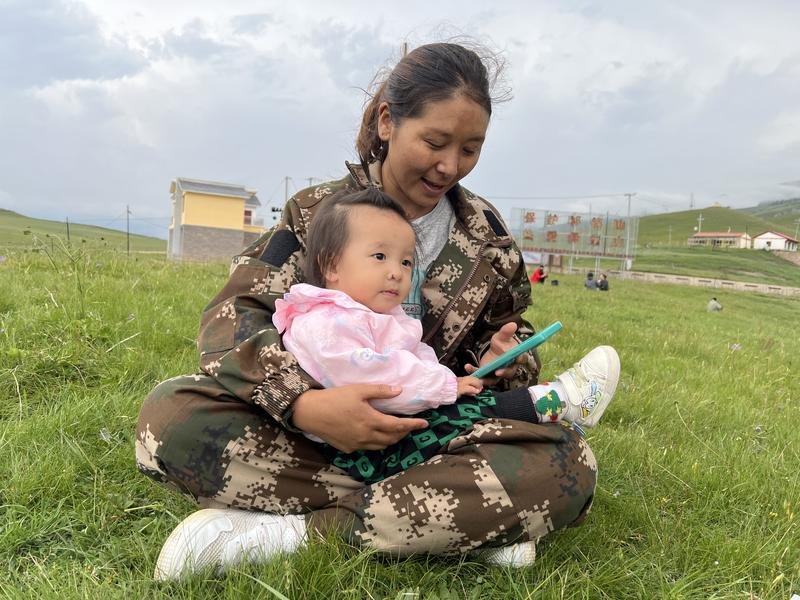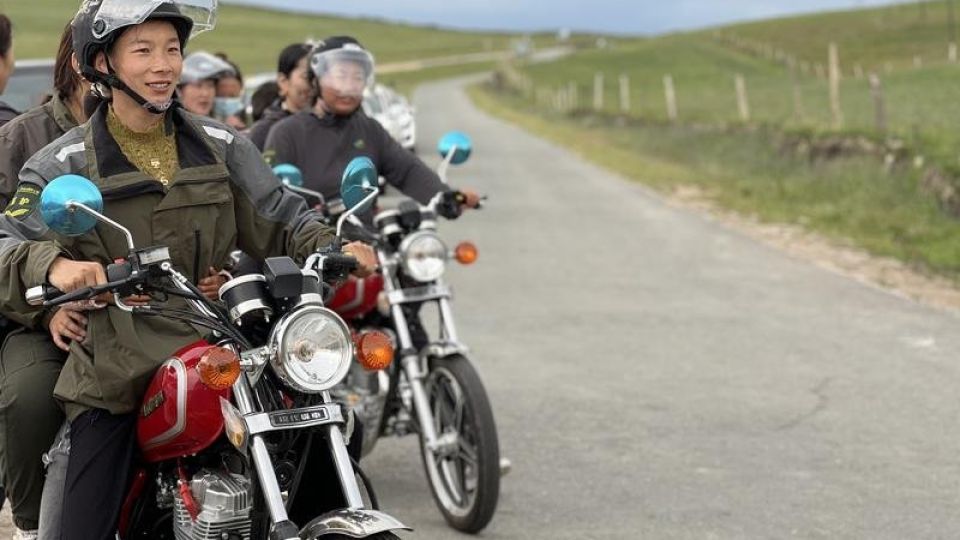February 1, 2023
BEIJING – In the front yard of Qingyanggou Ecological Management and Protection Station, in Qilian county, Haibei prefecture, Qinghai province, a row of red motorbikes are parked neatly. Beside the clean and well-maintained motorbikes, a little girl plays.
Established in 2016, the station employs 32 female custodians, with the oldest being 45 and the youngest 21. Among them, 27 are mothers. Most of their children spent their preschool childhood in the embrace of Qilian Mountains, following their mothers on the patrol.
When it’s raining or snowing, I patrol up the mountain driving a pickup truck; and when the weather is fine and pleasing, I ride the motorbike with the child on my back on patrol.
Sonam Kyi, custodian at Qingyanggou Ecological Management and Protection Station
“The concept of ‘loving the mountains and forests as much as loving ourselves’ was buried deep in the children’s hearts like a ‘seed’ through the day-to-day patrols,” says Yangmotso, 44, the head of the station.
In the Qilian Mountains, there are many places named gou, which means ravine in Chinese. Most of the places that hide in the folds between peaks have sufficient water resources and healthy grassland, and they provide a perfect setting for both people and animals.
The farmers, herdsmen, wildlife researchers and ecological custodians attribute the beautiful scenery and the growth of the wildlife population to the persistent ecological care over the past 10 years, and the creation of the Qilian Mountain National Park as a pilot project over the past five years.
It’s also a result of people’s rising awareness of environmental protection. It is now clearly and deeply appreciated by the local residents that harmony between man and nature is counting on everyone’s input.
During the day, custodians focus more on patrolling the 15,874 hectares of nearby forest.
And it’s also their duty to promote ecological protection, rescue wildlife and prevent fires and poaching. In the past few years, with the support of the government, the facilities of the station have been much improved, and it is now equipped with nine motorbikes and a pickup truck.
Also, many custodians developed photography skills.
“We are excellent photographers who are also good at riding horses and motorbikes. When we see rare species during the patrol, we capture and show the beautiful moment,” says Dekyi Sangmo, 27, who proudly pats the camera in her hand.
Most custodians have husbands who are either away working in a city nearby or busy elsewhere, and their children are left at home for them to look after.
It’s a tradition developed for female custodians to bring children to work.

Yudron, one of the custodians, with her 1-year-old daughter. Many of her fellow female colleagues take care of their children while working at the protection station. (XU HAOYU / CHINA DAILY)
Sonam Kyi, 37, has been working as a custodian for more than 10 years and has two daughters.
Lhamo Tsering, Sonam Kyi’s younger daughter, is just 1 year old, and has been growing up on her mother’s back for eight months. She often pokes her head out from behind her mother’s shoulder and quietly stares at the vibrant world in front of her.
“When it’s raining or snowing, I patrol up the mountain driving a pickup truck; and when the weather is fine and pleasing, I ride the motorbike with the child on my back on patrol,” Sonam Kyi says shyly.
Sonam Kyi claims that when the child is crying because of the burning sun or the bumpy road, she will shade the baby with an umbrella, comfort her by fondling her head or pick a beautiful Galsang flower to distract her.
“When this naughty little girl is given free access to nature, she can’t resist putting flowers and plants into her mouth, trying to taste them. I had to carry her all the time, often for over an hour straight.”
Almost every holiday, Sonam Kyi’s 16-year-old daughter, Lhakdron, comes to the station to accompany her mother, following her around on patrol as she used to since she turned 4.
“Seeing my mother contributing her force to the protection of the ecological environment in our hometown, I’m also encouraged to protect the plants and animals on Qilian Mountains that I grew up with,” says Lhakdron.
Tsering Drolma, 22, joined the station in 2019. Her grandmother used to be a custodian, and she filled the place after the grandmother retired. She feels her colleagues are very united, and the local scenery “massages” her eyes every day.
She’s deeply attached to her hometown.
“It was a wonderful and proud feeling to take over the job from my grandmother,” she says.
Yudron, 29, who wished to earn more money to cover family expenses, joined the custodian team at the beginning of 2020. It was never expected that she would become pregnant with her second child within a few months after starting the job.
“As I became a custodian, I felt the responsibility on my shoulder, and I didn’t want to stop working just because I was pregnant,” Yudron says.
Yangmotso specially assigned her to cover the area near her home. She didn’t miss one single patrol until the very day before the expected date of pre-birth care, and returned to work one month after giving birth.
Her daughter is now over 1 year old, and won’t stop smiling at people when she is in her mother’s arms. When Yudron is talking to others, the little girl quietly plays with her phone.
Sitting on the grass, Yudron pulls her shirt up and starts breastfeeding twice in half an hour.
Female custodians, who patrol with their children, carry many items in their backpacks every working day, including milk powder, feeding bottle, diapers, toys and bread. Sometimes, when they go on patrol, custodians take turns to share the sweet burden of climbing the mountain with the children on their backs. “We mothers often help each other out,” Yangmotso says happily.
“My mom is doing a very meaningful job,” Lhakdron says with a shy smile but firm eyes.


